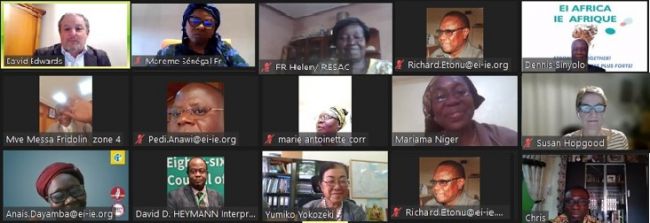EI Africa Regional Committee meets to review progress and set future priorities
The COVID-19 pandemic has impacted many EI member organizations, denying girls and boys, children from rural areas, children from underprivileged populations, persons with disabilities, migrants and refugees the right to quality education.
This was revealed during the Education International Africa Regional Committee (EIARC) virtual meeting, taking place on 9 and 10 March 2022.
In his opening remarks, Christian Addai Poku, EIARC Chairperson, expressed serious concern about the low COVID-19 vaccination rates and rising attacks on schools, educators and students Africa.
Adai-Poku said vaccine inequity and hesitancy remain some of the biggest challenges in the region, with only 11% of the African population fully vaccinated.
“Although COVAX (COVID-19 Vaccines Global Access) is a welcome initiative of the UN, it is yet to fully deliver on its promise of vaccine equity”, he concluded.
Adai Poku went on to enumerate the other challenges in the region, including terrorist attacks, military coups, cyclones, and human and trade union rights abuse. He however noted that despite these challenges and many others, the Africa region was able to carry out many successful activities, including capacity building, online conferences, research, production of tools and networking.
Susan Hopgood, Education International (EI) President, in her address underscored the need to build the capacity of EI member organisations in Africa.
“We need to fight together through campaigns, advocacy, lobbying and social dialogue, including collective bargaining”, she said.
She went on to stress, “We need to work together to strengthen education unions to enable them to organise and mobilise in defense of our values, our rights and those of our students”.
She encouraged the EIARC to demand universal access to appropriate digital technologies as EI reviews its Protocol on ICT. She also cited promoting gender equality in and through education is an important priority in the EI strategic plan.
She also urged EI member organisations to keep promoting the EI Manifesto on Quality Climate Change Education. She stated that EI would continue to respond to emergencies and to support members deal with the unfortunate aftermath of natural disasters and conflict like has recently been done for Madagascar and Mozambique following the floods that have devasted Southern Africa.
In his presentation on Global Education Trends, David Edwards, EI General Secretary, observed that crises are increasing, and these include COVID-19 and conflict. In addition to the climate crisis, which has led to migration, the situation in Ukraine was escalating with over two million people crossing the Ukrainian border in search of refuge in neighboring countries. He reiterated EI’s commitment to defend quality public education for all, including that of refugees.
Dr Yumiko Yokozeki, Director of UNESCO’s International Institute for Capacity Building in Africa (IICBA), also spoke at the meeting. In her presentation, she emphasized the reality that teachers face in Africa, as well as the importance of listening to teachers' opinions. She further added that the teaching profession should be well respected, and that all teachers should be recognised as professionals.

[Wed, 09 Mar 2022 17:49:00 +0000] | DIGG THIS
Education International · No. 3 Torshie Close, · Mempeasem · East Legon Extension · Accra · Ghana
Phone: +233.302.50.12.00 · Fax: +233.302.50.66.81 · Email: eirafoffice@ei-ie.org
Website Development and Design by Cyblance
